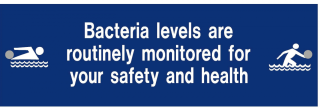Water Quality Testing

The Town of Falmouth begins water quality testing at the Town Landing in June. Testing is for certain levels of fecally-associated pathogens, enterococci, to determine if there is a health risk to the public who engage in water activities. Testing will be conducted throughout the summer, ending Labor Day weekend.
Falmouth follows the protocol of the Maine Healthy Beaches Program. Water at Maine’s lakes, ponds, and coastal swimming beaches can become contaminated by fecal matter which carries harmful bacteria and viruses. The U.S. Environmental Protection Agency’s (EPA) safety limits for recreational water contact is 104, the most probable number of enterococci per milliliters of sample water. When bacteria levels exceed this limit, there is an increased probability of contracting illness from the water.
Sources of fecal contamination may include malfunctioning septic systems, sewage treatment plant or collection system malfunction, agricultural runoff, pet or wildlife waste, boating waste, and poor sanitary practices at the beach. Contaminated runoff from land may enter the beach area via rivers, streams and storm drains, especially during wet weather conditions.
Beach advisories or closures can be an outcome of poor water quality tests. An advisory is a recommendation to the public to avoid water contact activities in areas where bacteria results have exceeded the U.S. EPA’s standards for recreational water contact. It is recommended that the public avoid all water contact activities during an advisory. Closures, more severe than an advisory, are determined by a number of potential factors and often based on chronic, unsafe bacteria results. The Town will use colored flags to indicate water quality conditions. A green flag indicates it is safe to swim. A yellow flag indicates an advisory, and a red flag indicates a closure. These flags and signage will be prominently located at the Town Landing.

